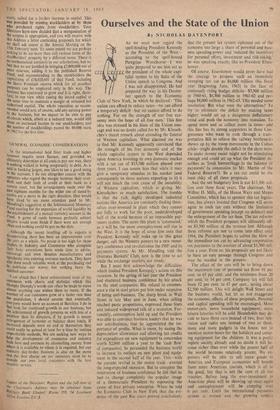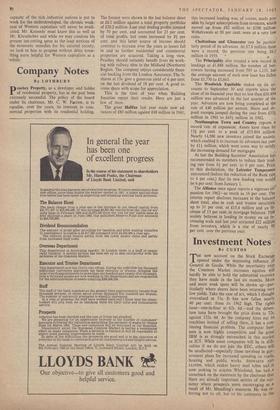Ourselves and the State of the Union
By NICHOLAS DAVENPORT As we must now regard the spell-binding President Kennedy as the President of the West— according to the spell-bound Peregrine Worsthorne—I was quite prepared to see him act as zfu tZXZZ,K, the president of the whole capi- talist system in his State of the Union speech to Congress. And I was not disappointed. He had prepared the way in his Decem- ber speech to the Economic Club of New York, in which he declared : 'This nation can afford to reduce taxes----we can afford a temporary deficit—but we cannot afford to do nothing. For on the strength of our free eco- nomy rests the hope of all free men.' This fine idea was stressed in his State of the Union mes- sage and was no doubt called for by Mr. Khrush- chev's recent remark about attending the funeral of Western capitalism. What alarmed me was to find Mr. Kennedy apparently convinced that the strength of his free economy and of the whole capitalist system in the West depended upon America boosting its own domestic market with a tax cut of $13,500 million phased over three years. I can assure him that while it may give a temporary stimulus to his market (and consequently to those nations exporting to it) it will not touch the root cause of the instability of Western capitalism, which is giving Mr. Khrushchev so much satisfaction. The trouble is that the rich, highly developed industrial nations like America are constantly finding them- selves over-invested in plant which they cannot put fully to work for the poor, underdeveloped half of the world because of an impossible pay- ments system. The more this plant is 'automated,' as it will be, the more unemployment will rise in the West. It is the hope of some (tree men that President Kennedy will wake up to this great danger, call the Western powers to a new mone- tary conference and revolutionise the IMF and its payments system. As Mr. Maudling told the Overseas Bankers' Club, now is the time to act while the exchange marketslare steady. But I must first acknowledge the difficulties which limited President Kenn,edy's action on this occasion. In the spring of last year the President had shattered business confidence by his attack on the steel companies. His refusal to counten- ance a rise in steel prices put him under suspicion of being antibusiness. The sharp break in Wall Street in late May and in June, when selling reached panic proportions, expressed those fears and induced widespread talk of a recession. For- tunately, consumption held up and the President was able to convince business leaders that he was not anti-business,, that he appreciated the im- portance of profits. What is more, by easing the depreciation allowances and allowing tax credits for expenditure on new equipment (a concession worth $2,000 million a year to the 'cash flow' of companies), he persuaded the business world to increase its outlays on new plant and equip- ment in the second half of the year. This—with the current revival in the motor trade-- averted the long-expected recession. But to complete the restoration of business confidence he felt that he had to change completely the popular image of a Democratic President by espousing the cause of free private enterprise. When he told the Economic Club in New York that the evi- dence of the past five years proved conclusively that the present tax system siphoned out of the economy too large a share of personal and busi- ness spending-power and 'reduced the incentives for personal effort, investment and risk-taking,' he was speaking exactly like ex-President Eisen- hower.
Of course, Eisenhower would never have had the courage to propose such an immediate sweeping tax cut as $6,000 million this fiscal year (beginning June, 1963) in the face of ominously rising budget deficits-33,900 million in 1960-61, $6,300 million in 1961-62 and per- haps $8,000 million in 1962-63. This needed some resolution. But what were the alternatives? To try to eliminate the deficit by making taxes higher would set up a dangerous deflationary trend and push the economy into recession. To spend more and so collect more in taxes—and this line has its strong supporters in those Con- gressmen who want to rush through a trans- portation Bill to relieve the railway bottlenecks shown up by the troop movements in the Cuban crisis—might double the deficit in the short term. To make money easier might not be stimulating enough and could set up what the President de- scribes as 'fresh haemorrhage in the balance of payments' (a concession to Mr. Martin of the Federal Reserve7). So a tax cut could be the least risky of all these' proposals.
And the net budgetary loss is not $13,500 mil- lion over three fiscal years. The chairman, Mr. Wilbur D. Mills, of the House Ways and Means Committee, which has to sponsor this tax legisla- tion, has always insisted that Congress will never agree to such tax cuts without the limitation of government spending (except on defence) and the enlargement of the tax base. The tax reforms which the President proposes will ultimately off- set $3,500 million of the revenue lost. Although these reforms are not to •come into effect until 1964, the President hopes to soften the blow of the immediate tax cut by advancing corporation tax payments to the amount of about $1,500 mil- lion a year. Even so, his proposals are not likely to have an easy passage through Congress and may be mauled in the process.
The effect of the cuts will be to bring down the maximum rate of personal tax from 91 per cent, to 65 per cent. and the minimum from 20 per cent. to 14 per cent. Company tax will fall from 52 per cent. to 47 per cent., saving about $2,500 million. 'phis will delight Wall Street and the business world, but let us not exaggerate the economic effects of these proposals. Personal and capital spending will be encouraged. More motor-cars, more household equipment, more leisure luxuries will be sold. Households may de- cide to have three cars instead of two, four tele- vision and radio sets instead of two or three, more and more gadgets in the house, not to mention motor-boats for the holidays and camp- ing equipment for the children. It was a pretty replete society already and no doubt it will be- come richer than ever while the poorer half of the world becomes relatively poorer. We ex- porters will be able to sell more goods to America and European economies will benefit from more American tourists, which is all to the good, but that is not the cure of all our troubles. Before tong the over-investment in American plant will be showing up once again and unemployment will he creeping over 6 per cent. Until the international payments system is revised and the growing surplus
capacity of the rich industrial nations is put to work for the underdeveloped, the chronic weak- ness of Western capitalism will never be eradi- cated. Mr. Kennedy must know this as well as Mr. Khrushchev and while we may condone his present tax-cutting spree as the least noxious of the economic remedies for his satiated society, we look to him to propose without delay some- thing more helpful for Western capitalism as a whole.































 Previous page
Previous page